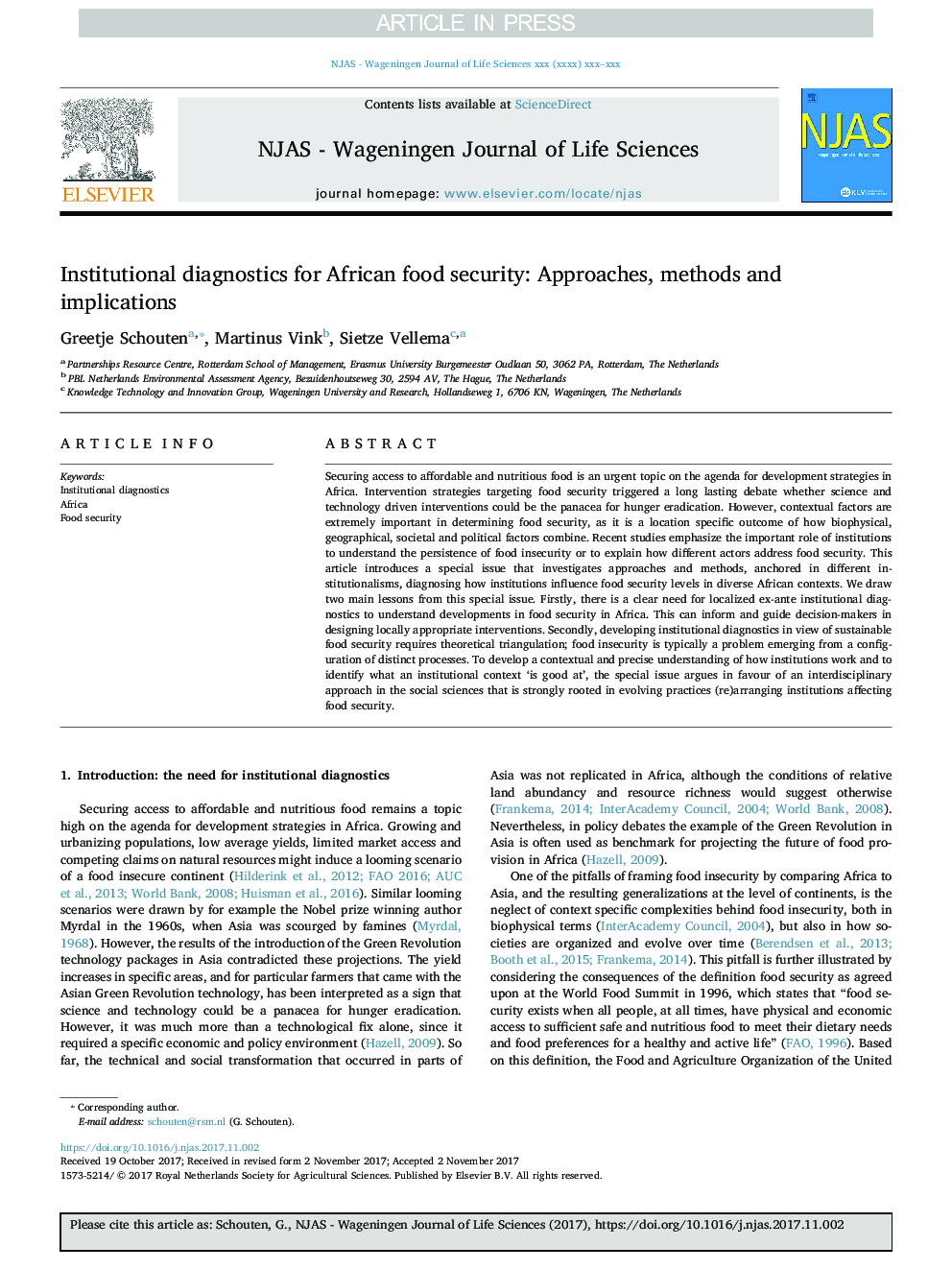| کد مقاله | کد نشریه | سال انتشار | مقاله انگلیسی | نسخه تمام متن |
|---|---|---|---|---|
| 8877142 | 1624053 | 2018 | 5 صفحه PDF | دانلود رایگان |
عنوان انگلیسی مقاله ISI
Institutional diagnostics for African food security: Approaches, methods and implications
ترجمه فارسی عنوان
تشخیص غیرمستقیم برای امنیت غذایی آفریقا: رویکردها، روشها و
دانلود مقاله + سفارش ترجمه
دانلود مقاله ISI انگلیسی
رایگان برای ایرانیان
کلمات کلیدی
تشخیص غیرمستقیم، آفریقا، امنیت غذایی،
ترجمه چکیده
دسترسی به غذای مقرون به صرفه و مقرون به صرفه موضوع مهمی در دستور کار استراتژی های توسعه در آفریقا است. استراتژی های مداخله ای که امنیت غذایی را هدف قرار داده اند، یک بحث طولانی مدت در مورد مداخلات علمی و فن آوری را ممکن می سازد که باعث می شود که ریشه کن سازی گرسنگی صورت گیرد. با این حال، عوامل محیطی در تعیین امنیت غذایی بسیار اهمیت دارد، زیرا این نتیجه خاصی است که عوامل فیزیکی، جغرافیایی، اجتماعی و سیاسی ترکیب می شوند. مطالعات اخیر بر نقش مهم موسسات برای درک پایداری ناامنی غذایی یا توضیح اینکه چگونه بازیگران مختلف به امنیت غذایی اهمیت می دهند تأکید می کنند. این مقاله یک مسئله ویژه است که روشها و روشهایی را که در نهادهای مختلفی متمرکز شده است، به منظور تشخیص اینکه چگونه موسسات در سطح امنیت غذایی در سطوح مختلف آفریقا تأثیر می گذارد، مورد بررسی قرار می دهد. ما دو درس اصلی را از این موضوع خاص یاد میگیریم. اولا، برای تشویق پیشرفت های امنیت غذایی در آفریقا، نیاز به روشنی تشخیص های نهادی محلی وجود دارد. این می تواند تصمیم گیرندگان را در طراحی مداخلات محلی مناسب راهنمایی کند. ثانیا، در حال توسعه تشخیص نهادی با توجه به امنیت غذایی پایدار، نیاز به نظارت تئوریک دارد؛ ناامنی غذایی به طور معمول یک مشکل از پیکربندی فرایندهای متمایز است. به منظور ایجاد یک درک متنی و دقیق از نحوه کارکرد موسسات و شناسایی آنچه که یک نهاد نهادی در این زمینه خوب است، موضوع ویژه به نفع یک رویکرد بین رشته ای در علوم اجتماعی است که به شدت ریشه در شیوه های در حال تغییر (تنظیم مجدد) موسسات دارد موثر بر امنیت غذایی.
موضوعات مرتبط
علوم زیستی و بیوفناوری
علوم کشاورزی و بیولوژیک
علوم کشاورزی و بیولوژیک (عمومی)
چکیده انگلیسی
Securing access to affordable and nutritious food is an urgent topic on the agenda for development strategies in Africa. Intervention strategies targeting food security triggered a long lasting debate whether science and technology driven interventions could be the panacea for hunger eradication. However, contextual factors are extremely important in determining food security, as it is a location specific outcome of how biophysical, geographical, societal and political factors combine. Recent studies emphasize the important role of institutions to understand the persistence of food insecurity or to explain how different actors address food security. This article introduces a special issue that investigates approaches and methods, anchored in different institutionalisms, diagnosing how institutions influence food security levels in diverse African contexts. We draw two main lessons from this special issue. Firstly, there is a clear need for localized ex-ante institutional diagnostics to understand developments in food security in Africa. This can inform and guide decision-makers in designing locally appropriate interventions. Secondly, developing institutional diagnostics in view of sustainable food security requires theoretical triangulation; food insecurity is typically a problem emerging from a configuration of distinct processes. To develop a contextual and precise understanding of how institutions work and to identify what an institutional context 'is good at', the special issue argues in favour of an interdisciplinary approach in the social sciences that is strongly rooted in evolving practices (re)arranging institutions affecting food security.
ناشر
Database: Elsevier - ScienceDirect (ساینس دایرکت)
Journal: NJAS - Wageningen Journal of Life Sciences - Volume 84, March 2018, Pages 1-5
Journal: NJAS - Wageningen Journal of Life Sciences - Volume 84, March 2018, Pages 1-5
نویسندگان
Greetje Schouten, Martinus Vink, Sietze Vellema,
